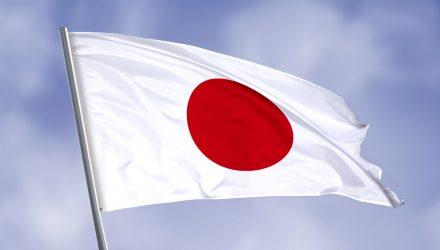Japan recently slipped into a recession, shedding its status as the world’s third-largest economy in the process. In theory, that should have weighed on Japanese equities and related exchange traded funds, but the reality is different and more positive.
The WisdomTree Japan Hedged Equity ETF (DXJ) jumped 2.70% last week, despite news of Japan’s recession coming to light. That pushed the fund to a one-month gain of 8.49%. Year to date, DXJ is higher by 17.46%, or more than double the returns posted by the S&P 500. All of that is against the backdrop of economic contraction.
On the surface, it’d be easy for investors to be leery of Japanese stocks and ETFs such as DXJ on the basis that the recession could eventually penalize the country’s risk assets. That’s a logical way of evaluating the situation. However, Japanese stocks, including DXJ holdings, would be more vulnerable to recessionary pressures if they were saddled with suspect fundamentals. Fortunately, the opposite is true.
Fabulous Fundamentals Support Japan ETF DXJ
The recession notwithstanding, global investors have good reasons to consider Japanese equities and ETFs such as DXJ. One of those factors is ongoing weakness of the yen against the U.S. dollar, which highlights the potency of DXJ’s currency hedging mechanism. But there’s more to the story.
“The main driver of Japan’s stock market resurgence lies in the robust corporate earnings reported by major companies,” noted deVere Group CEO Nigel Green. “Banking, electronics, and consumer stocks, in particular, have displayed stellar financial performances, instiling confidence in investors.”
Green’s comment above is meaningful to investors considering DXJ because the ETF allocates approximately 46% of its combined weight to the consumer discretionary, financial services, and technology sectors. Those are the ETF’s second- through fourth-largest sector weights, respectively.
Not to be forgotten, the fact that Japanese companies are growing earnings even as the economy contracts is a positive sign — one that shows investors DXJ member firms are flexible and resilient. Plus, the Japanese government is stepping up efforts to make the equity market there even more attractive to global market participants. That’s a longer-ranging factor that could pay dividends for DXJ investors.
“Regulatory reforms aimed at streamlining procedures, reducing bureaucracy, and enhancing transparency are instiling confidence in foreign investors,” added Green. “The removal of barriers and the promotion of a business-friendly environment contribute to the positive sentiment, making Japanese stocks an increasingly appealing choice for those seeking long-term growth.”
For more news, information, and analysis, visit the Modern Alpha Channel.








